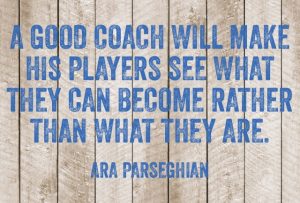As this is being written, the author is sitting comfortably inside on a Sunday morning. It’s 85F outside but about 70F inside. Yesterday, a Saturday, the temperatures reached 99F with a “real feel” of over 110F. Early yesterday morning there were a few boys and girls club sports teams practicing and every coach, every parent was keeping a close eye out to make sure none of the kids got dehydrated or suffered a heat related injury. The parents were under their easy-up awnings and drinking ice-cold bottles of water from coolers. The kids were drinking every 15 minutes (roughly). The coaches? Drank when they could get the necessary 30 seconds as they coached, answered questions, moved equipment and more. At the end of one practice, the coach thanked every player for showing up and working hard. He thanked the parents for getting up early to bring the kids for practice. One parent… ONE parent returned the thanks, appreciating the coach’s dedicated and willingness to get up early, work in the heat, and add value to the children’s lives. One…
It’s been my blessing to assist and support several people as they pursue their fitness goals. I make no claim of being a certified personal trainer. I’m not (yet). I make no claim of being a certified nutritionist. I’m not (yet). I am not a financial advisor, spiritual leader, etc. I make sure people know up front that while I am pursuing two of those certifications (personal trainer and nutritionist), I am not… yet. If they take my advice it is always prefaced with, “But double check with your doctor and make sure your current health situation won’t be harmed, but will in fact be improved by following this guidance.”
It’s been my experience as I pursue my own health and fitness goals, helping  a few others along on theirs, that people all too often forget a couple things about coaches. As a Team Beach Body Independent Coach, I usually use “coach” to refer to what I do rather than “trainer” or a few other more specific terms. I’ve had a couple people suggest I should pursue being a “life coach” but I just can’t imagine, knowing how long it took me to get my own act together, that anyone would want to follow my advice. But what are the things about coaches people tend to forget?
a few others along on theirs, that people all too often forget a couple things about coaches. As a Team Beach Body Independent Coach, I usually use “coach” to refer to what I do rather than “trainer” or a few other more specific terms. I’ve had a couple people suggest I should pursue being a “life coach” but I just can’t imagine, knowing how long it took me to get my own act together, that anyone would want to follow my advice. But what are the things about coaches people tend to forget?
First, a coach doesn’t start out as a coach. Just like the master was once an apprentice, a coach was once a brand new player – in any sport. He was near completely ignorant of what any game required; had to learn all of the knowledge necessary and practice to master the skills. At some point he began learning the strategies and demonstrated the ability to apply them. Maybe he (or she) became an assistant coach and then stepped up when the time came. Maybe there was just no one else to fill the slot when it was needed and s/he volunteered. No matter how they came to be “the coach,” they didn’t start out that way.
Second, a good coach knows that they don’t know it all. Just like the best teachers are perpetual students, the best coaches are always trying to learn. Here’s something many folks forget about that: the people being coached are learning while the coach is coaching. But the coach doesn’t learn as much in that same time space so s/he has to go learn before or after the practice sessions. What’s the mean? It usually means that the coach spends twice as much time in the process of coaching as the people being coached spend in the applied practice time frame. One hour of practice equals two hours of work for the coach. There is always preparation and debrief/recovery time for the coach added to the actual practice time.
 Third, and this is a big one, the coach is constantly offering critique, observation and motivation to the player(s). S/he is always looking for ways the player(s) can improve their game and helping them to do so. Where the player is lacking, the coach observes, comments, teaches, assists with mastery. Where the player is doing well, the coach praises and offers encouragement to maintain performance lest the player see a loss of skill from lack of practice. Where the player practices hard and shows dedication, the coach congratulates and encourages continued commitment.
Third, and this is a big one, the coach is constantly offering critique, observation and motivation to the player(s). S/he is always looking for ways the player(s) can improve their game and helping them to do so. Where the player is lacking, the coach observes, comments, teaches, assists with mastery. Where the player is doing well, the coach praises and offers encouragement to maintain performance lest the player see a loss of skill from lack of practice. Where the player practices hard and shows dedication, the coach congratulates and encourages continued commitment.
Who does those things for the coach? Using personal trainers as the example, have you ever seen a fat, sloppy, lazy personal trainer? Not a successful one. No one wants to work hard to be built like Bluto. One look at a personal trainer can tell you whether or not they’ve been committed to following their own advice and I for one will not follow the advice of a person who doesn’t follow it themselves. So, that personal trainer shows up at the gym to guide you through a workout. S/he works you through a series of exercises, hopefully balanced to include flexibility, strength and endurance. The exercises might target a specific muscle group (or two) or be whole body. While you’re working out, the trainer has conversation with you about the desired effects of what you’re doing, pushes you through one or two more reps than you thought you were capable of and discusses your nutrition along the way. At the end of the workout, the trainer gives you a few words of praise for how hard you worked, encourages you to work even harder next time and reminds you to stay on track with nutrition until your next session. Here’s the question: Between that time you say, “Thanks. See you next time!” and the next time with your coach, who is praising, encouraging and motivating your trainer?
A lot of people will think the trainer doesn’t need it. My question will always be, “Why would you think that?” Yes, some people are self-motivated and where motivation wains, self-discipline takes over. They understand, “You don’t have to like it, you just have to do it,” as the statement applies to reaching their goals or maintaining status quo. Still, even if they’re that person that doesn’t NEED words of encouragement, praise or motivation, they still appreciate hearing them. The best trainers and coaches in the world appreciate hearing, “Hey, great job today! Thanks for your hard work. Keep on pushing and we’ll look forward to another great practice/session next time!” Even if they’re getting paid for the training/coaching, and most especially if they’re not, they appreciate hearing, “Thanks. I really needed that extra push today and you found just the right way to do it!” They appreciate hearing, “Thanks for setting the example. So many times I’ve wanted to quit, but your dedication to the process is the example that I try to emulate.”
What I’m trying to say, using way too many words is, coaches and trainers need thanks too. They need praise, words of encouragement, motivation and recognition. It is relatively easy to master a physical performance as compared to mastering constant motivation and discipline. The encouraging and appreciative words helps fuel the coach/trainer’s motivation and discipline. Keep that in mind the next time you’re talking to yours.
